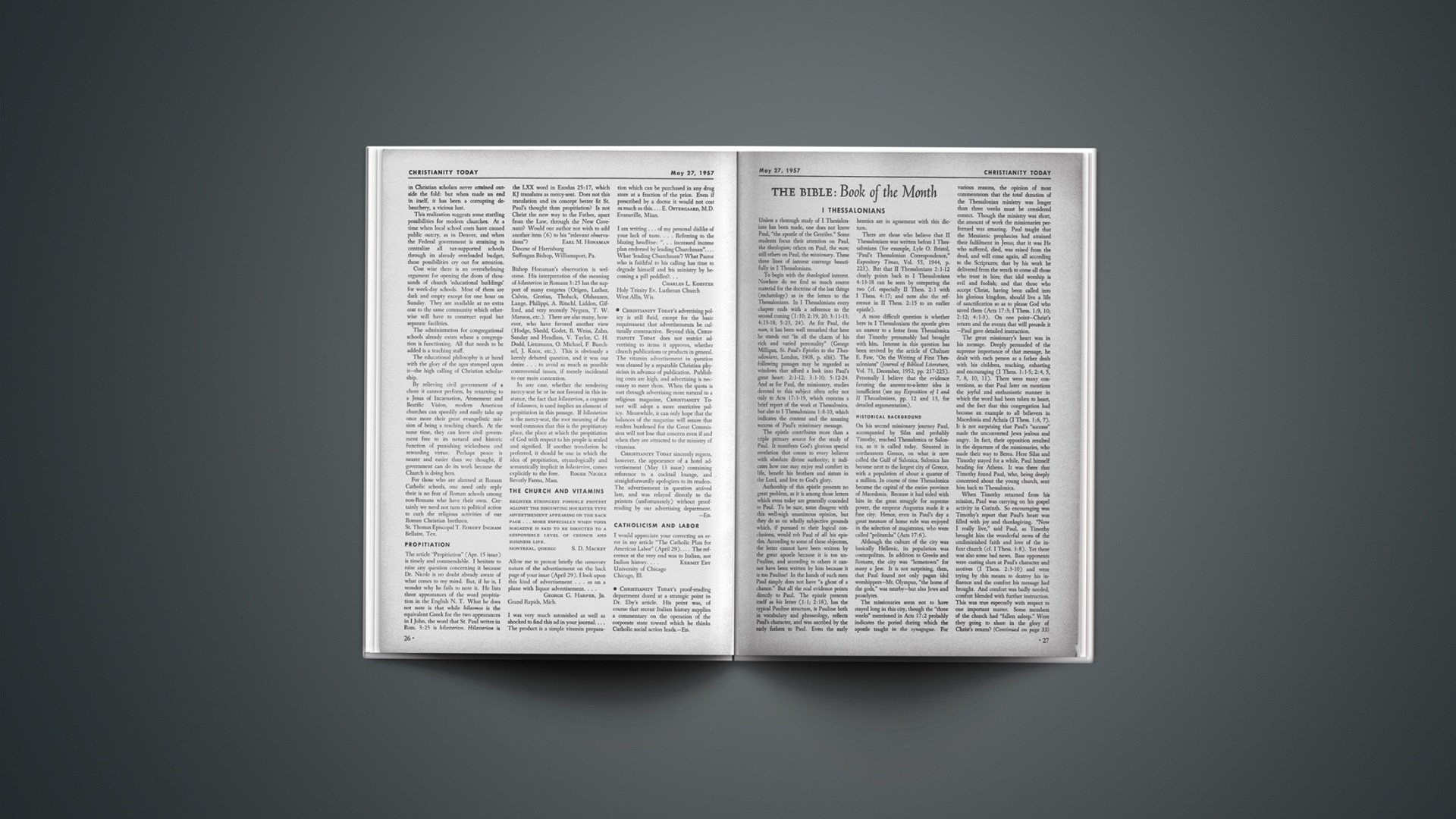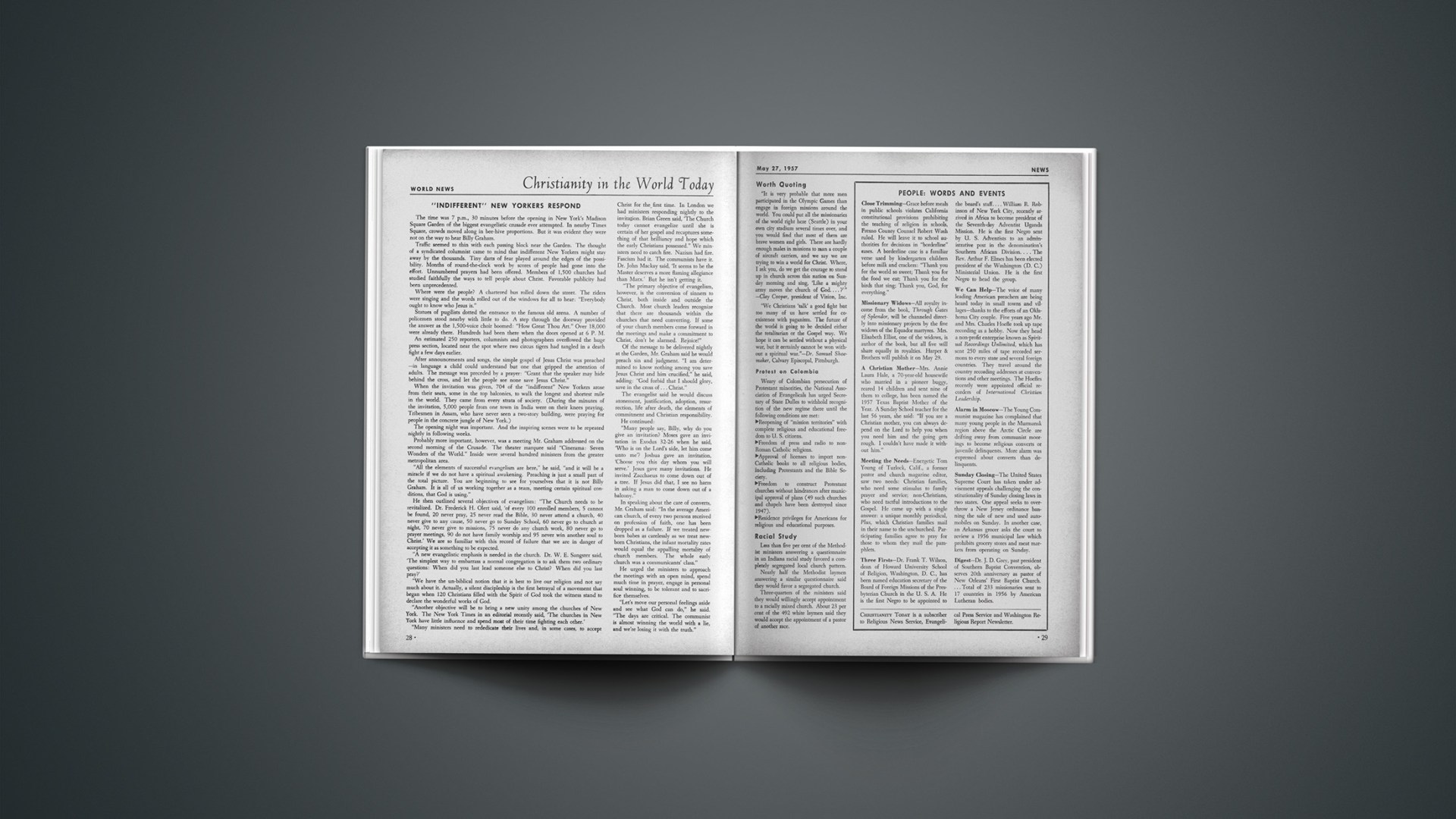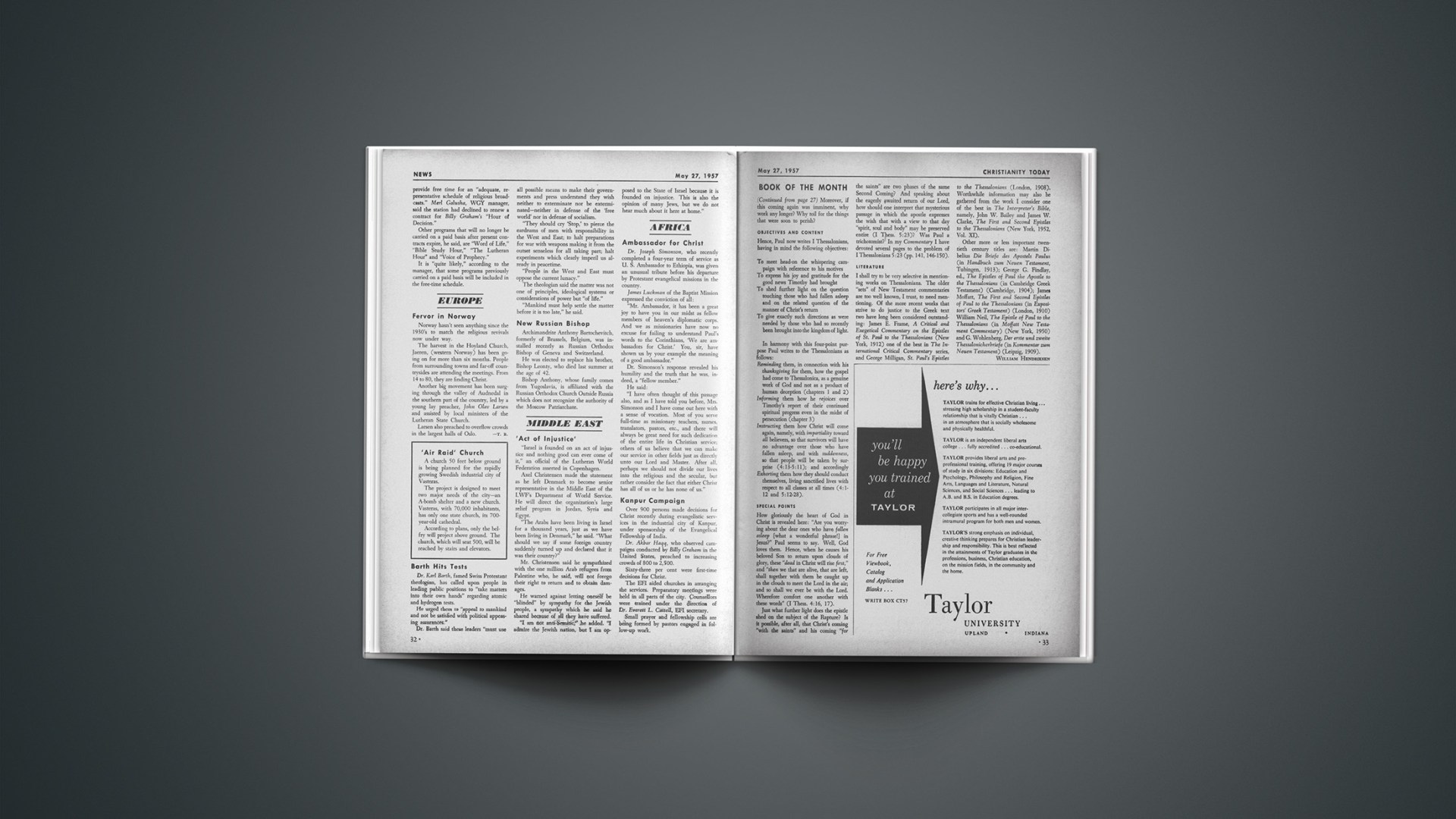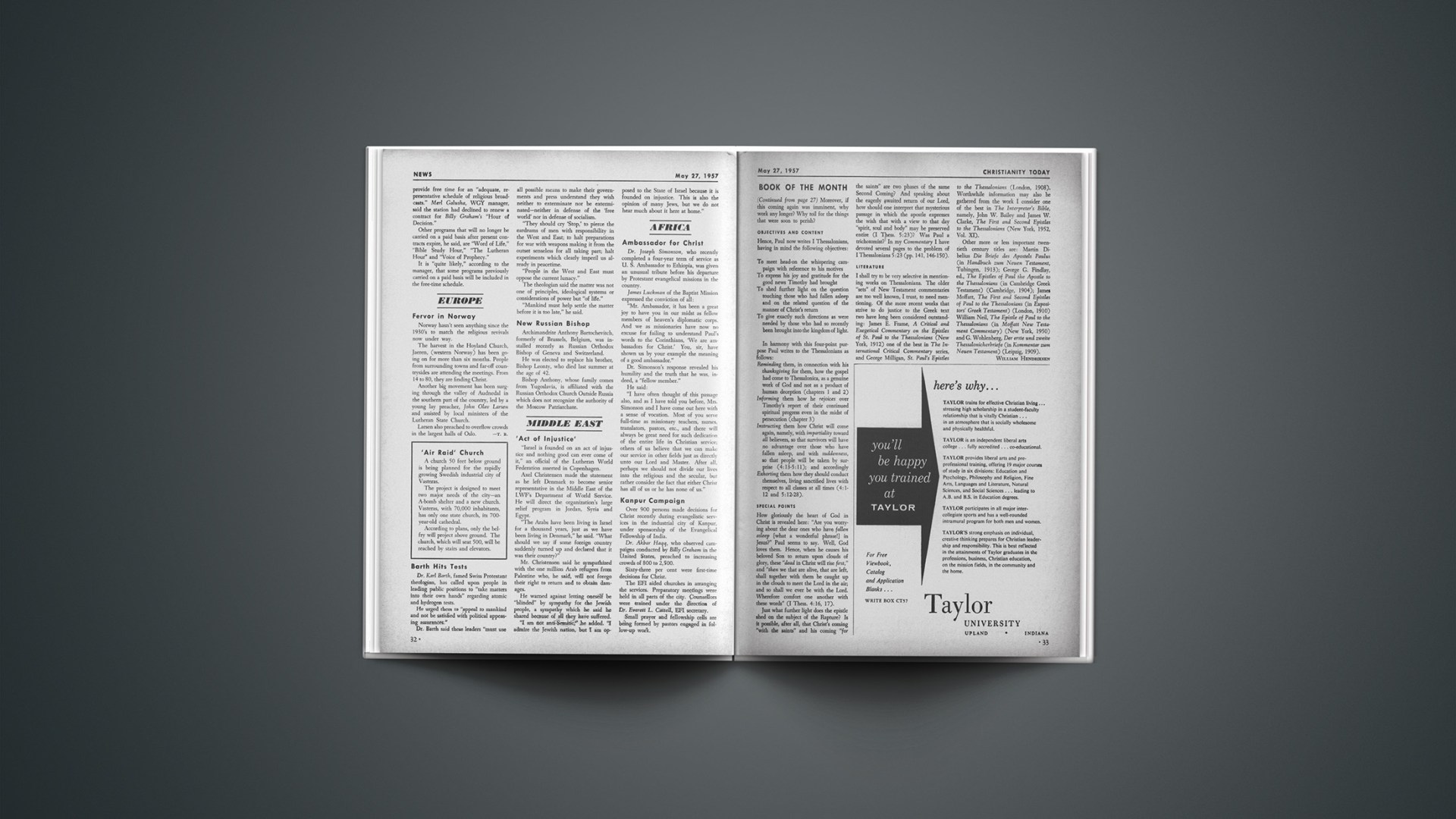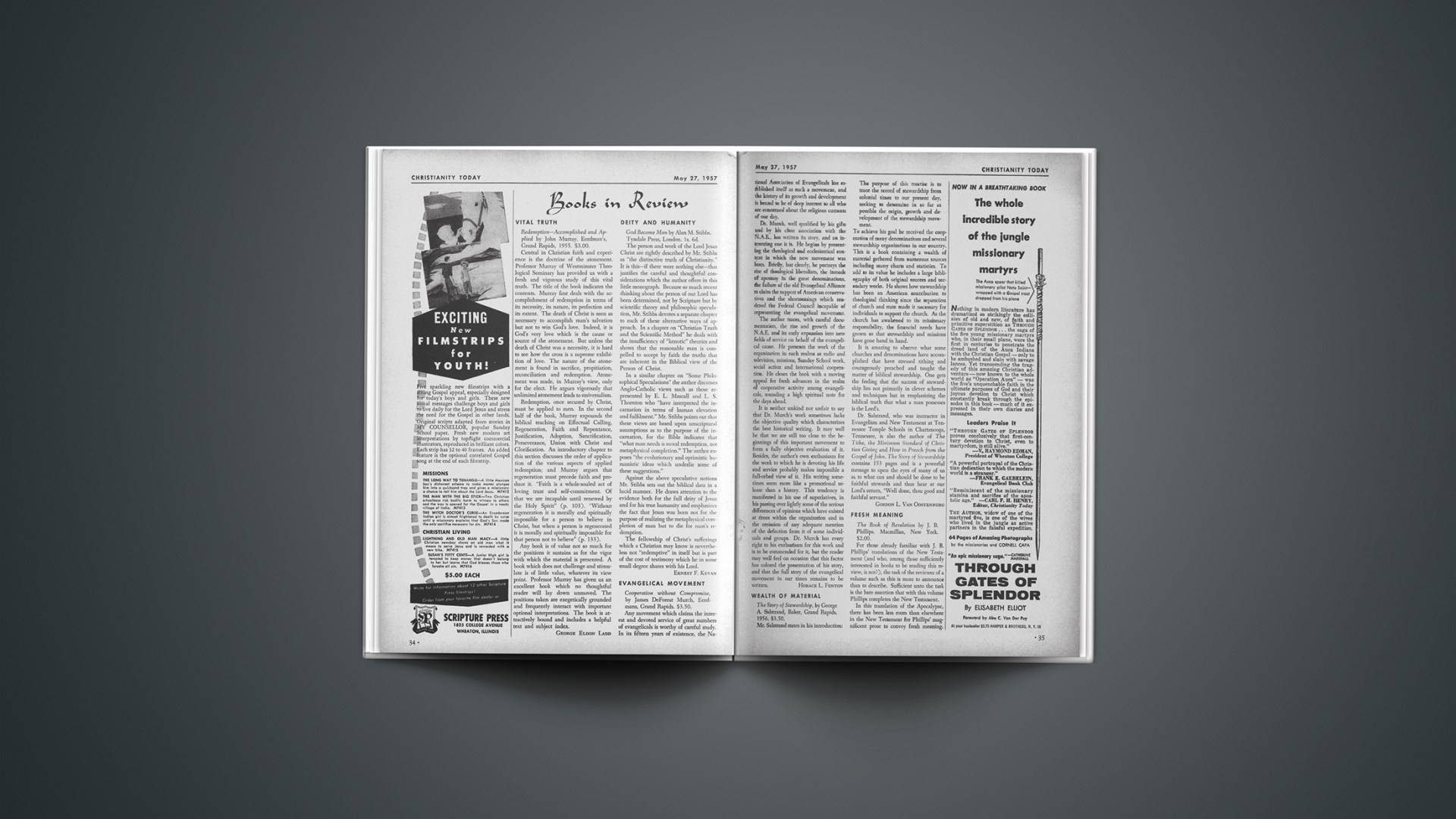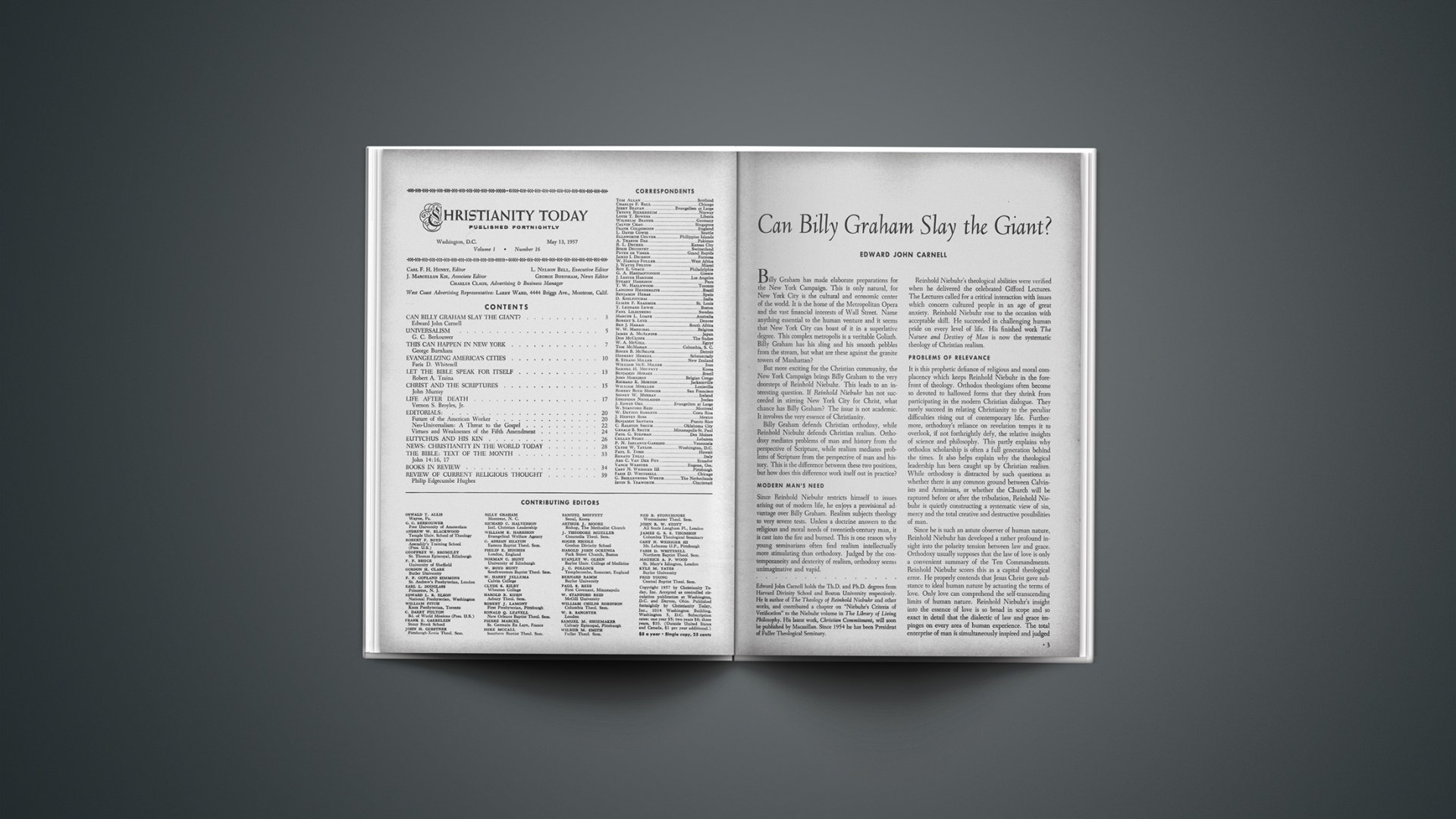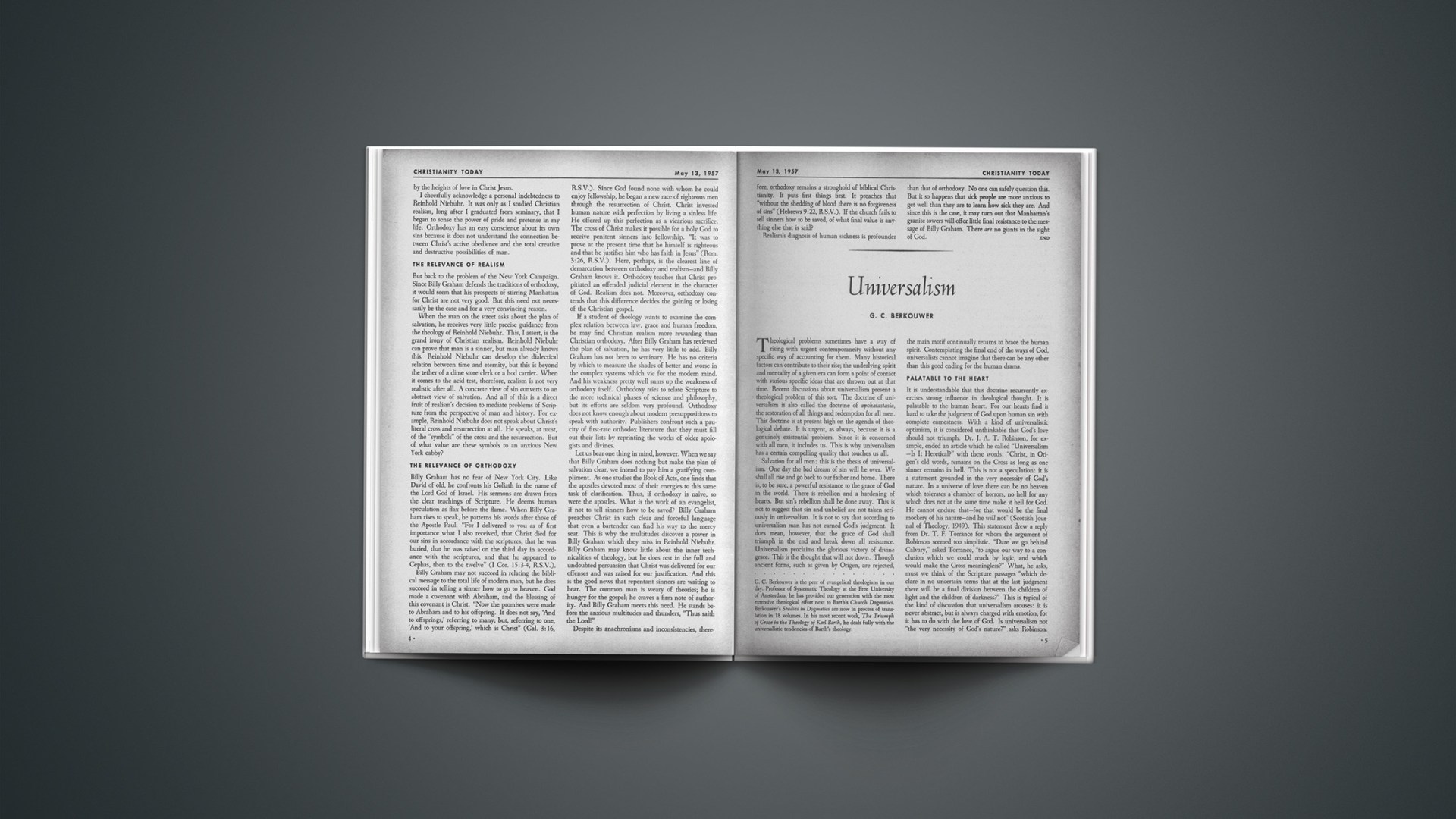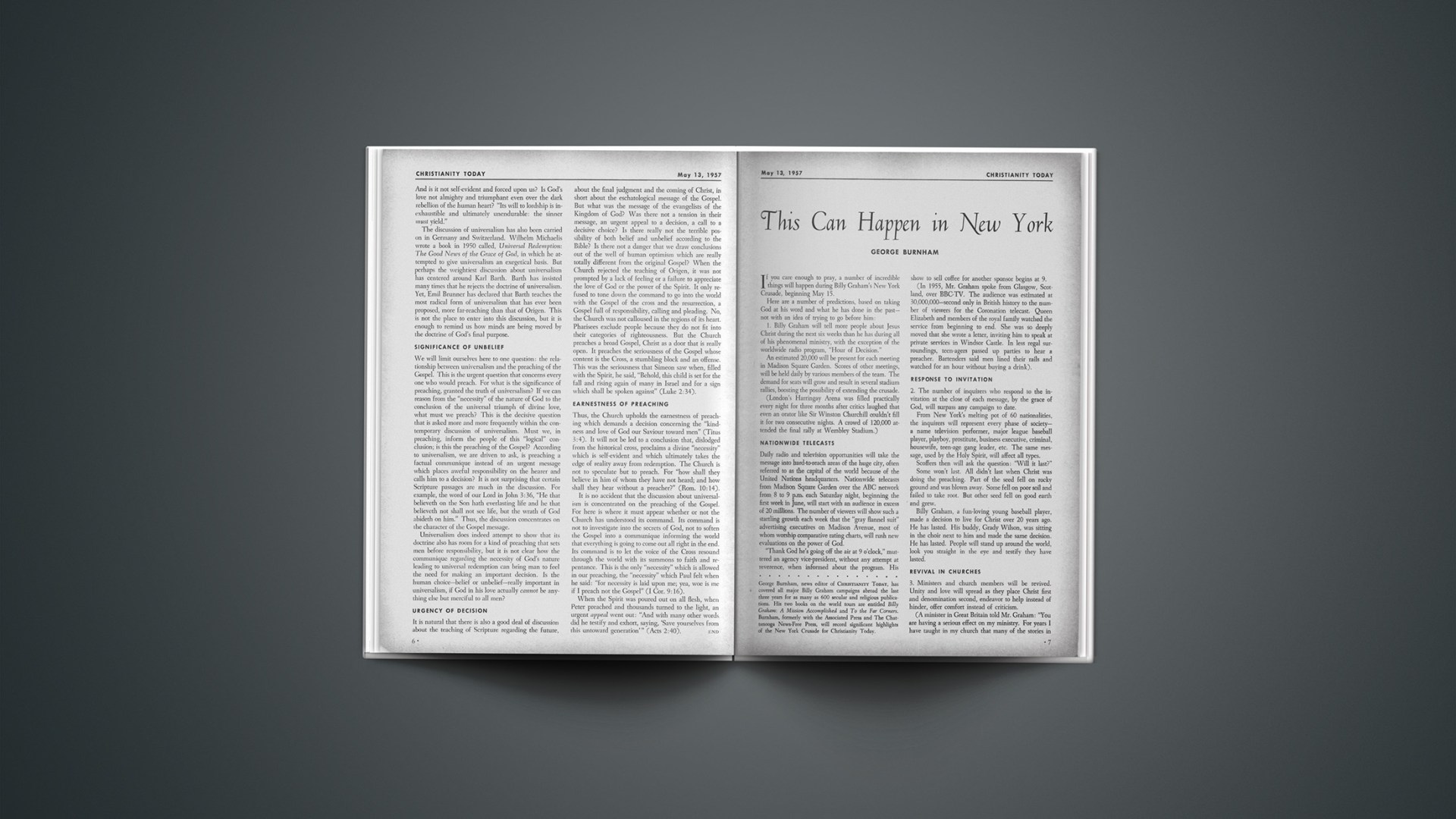Unless a thorough study of I Thessalonians has been made, one does not know Paul, “the apostle of the Gentiles.” Some students focus their attention on Paul, the theologian; others on Paul, the man; still others on Paul, the missionary. These three lines of interest converge beautifully in I Thessalonians.
To begin with the theological interest. Nowhere do we find so much source material for the doctrine of the last things (eschatology) as in the letters to the Thessalonians. In I Thessalonians every chapter ends with a reference to the second coming (1:10; 2:19, 20; 3:11–13; 4:13–18; 5:23, 24). As for Paul, the man, it has been well remarked that here he stands out “in all the charm of his rich and varied personality” (George Milligan, St. Paul’s Epistles to the Thessalonians, London, 1908, p. xliii). The following passages may be regarded as windows that afford a look into Paul’s great heart: 2:1–12; 3:1–10; 5:12–24. And as for Paul, the missionary, studies devoted to this subject often refer not only to Acts 17:1–19, which contains a brief report of the work at Thessalonica, but also to 1 Thessalonians 1:8–10, which indicates the content and the amazing success of Paul’s missionary message.
The epistle contributes more than a triple primary source for the study of Paul. It manifests God’s glorious special revelation that comes to every believer with absolute divine authority; it indicates how one may enjoy real comfort in life, benefit his brothers and sisters in the Lord, and live to God’s glory.
Authorship of this epistle presents no great problem, as it is among those letters which even today are generally conceded to Paul. To be sure, some disagree with this well-nigh unanimous opinion, but they do so on wholly subjective grounds which, if pursued to their logical conclusions, would rob Paul of all his epistles. According to some of these objectors, the letter cannot have been written by the great apostle because it is too un-Pauline, and according to others it cannot have been written by him because it is too Pauline! In the hands of such men Paul simply does not have “a ghost of a chance.” But all the real evidence points directly to Paul. The epistle presents itself as his letter (1:1; 2:18), has the typical Pauline structure, is Pauline both in vocabulary and phraseology, reflects Paul’s character, and was ascribed by the early fathers to Paul. Even the early heretics are in agreement with this dictum.
There are those who believe that II Thessalonians was written before I Thessalonians (for example, Lyle O. Bristol, “Paul’s Thessalonian Correspondence,” Expository Times, Vol. 55, 1944, p. 223). But that 2 Thessalonians 2:1–12 clearly points back to 1 Thessalonians 4:13–18 can be seen by comparing the two (cf. especially 2 Thess. 2:1 with 1 Thess. 4:17; and note also the reference in 2 Thess. 2:15 to an earlier epistle).
A more difficult question is whether here in I Thessalonians the apostle gives an answer to a letter from Thessalonica that Timothy presumably had brought with him. Interest in this question has been revived by the article of Chalmer E. Faw, “On the Writing of First Thessalonians” (Journal of Biblical Literature, Vol. 71, December, 1952, pp. 217–225). Personally I believe that the evidence favoring the answer-to-a-letter idea is insufficient (see my Exposition of I and II Thessalonians, pp. 12 and 13, for detailed argumentation).
Historical Background
On his second missionary journey Paul, accompanied by Silas and probably Timothy, reached Thessalonica or Salonica, as it is called today. Situated in northeastern Greece, on what is now called the Gulf of Salonica, Salonica has become next to the largest city of Greece, with a population of about a quarter of a million. In course of time Thessalonica became the capital of the entire province of Macedonia. Because it had sided with him in the great struggle for supreme power, the emperor Augustus made it a free city. Hence, even in Paul’s day a great measure of home rule was enjoyed in the selection of magistrates, who were called “politarchs” (Acts 17:6).
Although the culture of the city was basically Hellenic, its population was cosmopolitan. In addition to Greeks and Romans, the city was “hometown” for many a Jew. It is not surprising, then, that Paul found not only pagan idol worshippers—Mt. Olympus, “the home of the gods,” was nearby—but also Jews and proselytes.
The missionaries seem not to have stayed long in this city, though the “three weeks” mentioned in Acts 17:2 probably indicates the period during which the apostle taught in the synagogue. For various reasons, the opinion of most commentators that the total duration of the Thessalonian ministry was longer than three weeks must be considered correct. Though the ministry was short, the amount of work the missionaries performed was amazing. Paul taught that the Messianic prophecies had attained their fulfilment in Jesus; that it was He who suffered, died, was raised from the dead, and will come again, all according to the Scriptures; that by his work he delivered from the wrath to come all those who trust in him; that idol worship is evil and foolish; and that those who accept Christ, having been called into his glorious kingdom, should live a life of sanctification so as to please God who saved them (Acts 17:3; 1 Thess. 1:9, 10; 2:12; 4:1–3). On one point—Christ’s return and the events that will precede it—Paul gave detailed instruction.
The great missionary’s heart was in his message. Deeply persuaded of the supreme importance of that message, he dealt with each person as a father deals with his children, teaching, exhorting and encouraging (1 Thess. 1:1–5; 2:4, 5, 7, 8, 10, 11). There were many conversions, so that Paul later on mentions the joyful and enthusiastic manner in which the word had been taken to heart, and the fact that this congregation had become an example to all believers in Macedonia and Achaia (1 Thess. 1:6, 7). It is not surprising that Paul’s “success” made the unconverted Jews jealous and angry. In fact, their opposition resulted in the departure of the missionaries, who made their way to Berea. Here Silas and Timothy stayed for a while, Paul himself heading for Athens. It was there that Timothy found Paul, who, being deeply concerned about the young church, sent him back to Thessalonica.
When Timothy returned from his mission, Paul was carrying on his gospel activity in Corinth. So encouraging was Timothy’s report that Paul’s heart was filled with joy and thanksgiving. “Now I really live,” said Paul, as Timothy brought him the wonderful news of the undiminished faith and love of the infant church (cf. 1 Thess. 3:8). Yet there was also some bad news. Base opponents were casting slurs at Paul’s character and motives (1 Thess. 2:3–10) and were trying by this means to destroy his influence and the comfort his message had brought. And comfort was badly needed, comfort blended with further instruction. This was true especially with respect to one important matter. Some members of the church had “fallen asleep.” Were they going to share in the glory of Christ’s return? Moreover, if this coming again was imminent, why work any longer? Why toil for the things that were soon to perish?
Objectives And Content
Hence, Paul now writes I Thessalonians, having in mind the following objectives:
To meet head-on the whispering campaign with reference to his motives
To express his joy and gratitude for the good news Timothy had brought
To shed further light on the question touching those who had fallen asleep and on the related question of the manner of Christ’s return
To give exactly such directions as were needed by those who had so recently been brought into the kingdom of light.
In harmony with this four-point purpose Paul writes to the Thessalonians as follows:
Reminding them, in connection with his thanksgiving for them, how the gospel had come to Thessalonica, as a genuine work of God and not as a product of human deception (chapters 1 and 2)
Informing them how he rejoices over Timothy’s report of their continued spiritual progress even in the midst of persecution (chapter 3)
Instructing them how Christ will come again, namely, with impartiality toward all believers, so that survivors will have no advantage over those who have fallen asleep, and with suddenness, so that people will be taken by surprise (4:13–5:11); and accordingly
Exhorting them how they should conduct themselves, living sanctified lives with respect to all classes at all times (4:1–12 and 5:12–28).
Special Points
How gloriously the heart of God in Christ is revealed here: “Are you worrying about the dear ones who have fallen asleep [what a wonderful phrase!] in Jesus?” Paul seems to say. Well, God loves them. Hence, when he causes his beloved Son to return upon clouds of glory, these “dead in Christ will rise first,” and “then we that are alive, that are left, shall together with them be caught up in the clouds to meet the Lord in the air; and so shall we ever be with the Lord. Wherefore comfort one another with these words” (1 Thess. 4:16, 17).
Just what further light does the epistle shed on the subject of the Rapture? Is it possible, after all, that Christ’s coming “with the saints” and his coming “for the saints” are two phases of the same Second Coming? And speaking about the eagerly awaited return of our Lord, how should one interpret that mysterious passage in which the apostle expresses the wish that with a view to that day “spirit, soul and body” may be preserved entire (1 Thess. 5:23)? Was Paul a trichotomist? In my Commentary I have devoted several pages to the problem of 1 Thessalonians 5:23 (pp. 141, 146–150).
Literature
I shall try to be very selective in mentioning works on Thessalonians. The older “sets” of New Testament commentaries are too well known, I trust, to need mentioning. Of the more recent works that strive to do justice to the Greek text two have long been considered outstanding: James E. Frame, A Critical and Exegetical Commentary on the Epistles of St. Paul to the Thessalonians (New York, 1912) one of the best in The International Critical Commentary series, and George Milligan, St. Paul’s Epistles to the Thessalonians (London, 1908). Worthwhile information may also be gathered from the work I consider one of the best in The Interpreter’s Bible, namely, John W. Bailey and James W. Clarke, The First and Second Epistles to the Thessalonians (New York, 1952, Vol. XI).
Other more or less important twentieth century titles are: Martin Dibelius Die Briefe des Apostels Paulus (in Handbuch zum Neuen Testament, Tubingen, 1913); George G. Findlay, ed., The Epistles of Paul the Apostle to the Thessalonians (in Cambridge Greek Testament) (Cambridge, 1904); James Moffatt, The First and Second Epistles of Paul to the Thessalonians (in Expositors’ Greek Testament) (London, 1910) William Neil, The Epistle of Paul to the Thessalonians (in Moffatt New Testament Commentary) (New York, 1950) and G. Wohlenberg, Der erste und zweite Thessalonicherbriefe (in Kommentar zum Neuen Testament) (Leipzig, 1909).

